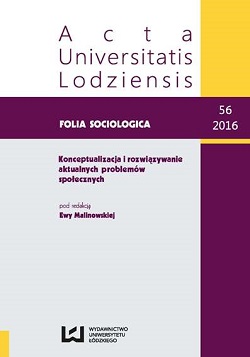Dimensions of contemporary design and the concept of sustainable development
DOI:
https://doi.org/10.18778/0208-600X.56.02Keywords:
sustainable development, design, sustainable designAbstract
After the industrial revolution period appeared the reflection on condition of human life and condition of environment. It became clear that the destructive policy of industrial society requires a radical reorientation. Therefore, as experts point out, modern society should take responsibility for promoting sustainable development, due to keep a balance between the sphere of human existence and welfare of the environment. The present text raises the issue of sustainable development from the perspective of social sciences and stresses the role of specialists actually affecting the shape of the environment in which we live – urban planners, architects and designers. These groups are actively working towards our environment, design objects and create new significant spaces. They design in a sustainable way (sustainable design). This text will provide a vision of sustainable development as the background for changes in the dimensions of the designer’ profession and the role of contemporary design.
References
Adamczyk J., Nitkiewicz T. (2007), Programowanie zrównoważonego rozwoju przedsiębiorstw, Polskie Wydawnictwo Ekonomiczne, Warszawa.
Google Scholar
Adapting Public Space To Climate Change (2008), Horticulture Week on behalf of CABE Space, July, http://webarchive.nationalarchives.gov.uk/20110118095356/http://www.cabe.org.uk/files/adapting-public-space-to-climate-change.pdf (20.09.2015).
Google Scholar
Agenda 21, http://sustainabledevelopment.un.org/content/documents/agenda21.pdf (20.08.2015).
Google Scholar
Aligned For Sustainable Design. An A-B-C-D Approach To Making Better Products (2008), “Business for Social Responsibility and IDEO”, www.bsr.org (2.09.2015).
Google Scholar
Borowik R. (2004), Postulat szerszej wykładni z koncepcji zrównoważonego i trwałego rozwoju, „Prakseologia”, nr 144, s. 77–88, http://www.kozminski.edu.pl/fileadmin/wspolne_elementy/Jednostki/Czasopismo_MBA/Prakseologia_2004.pdf (20.09.2015).
Google Scholar
Buchanan R. (2001), Design and the New Rhetoric: Productive Arts in the Philosophy of Culture, “Philosophy and Rhetoric”, Vol. 34, No. 3, 2001, The Pennsylvania State University, University Park, https://www.ryanvarick.com/uploads/buchanan.pdf (25.09.2015).
Google Scholar
DOI: https://doi.org/10.1353/par.2001.0012
Burns T., Sinfield S., Holley D. (2006), The silent stakeholder: an exploration of the student as stakeholder in the UK Government e-learning strategy 2005, The Corporate Social Responsibility Conference, Edrine, Turkey.
Google Scholar
Ciążela H. (2004), Idea zrównoważonego rozwoju a współczesna kondycja moralna, „Prakseologia”, nr 144, s. 53–65, http://www.kozminski.edu.pl/fileadmin/wspolne_elementy/Jednostki/Czasopismo_MBA/Prakseologia_2004.pdf (20.09.2015).
Google Scholar
Creativity, Design And Business Performance (2005), “DTI Economics Paper”, No. 15 (November), http://www.ico-d.org/database/files/library/economics_paper15.pdf (20.09.2015).
Google Scholar
Cudowska-Sojko A. (2012), Zrównoważony rozwój a globalizacja konsumpcji, „Handel Wewnętrzny”, t. 1: Trendy i wyzwania zrównoważonego rozwoju w XXI wieku, s. 16–24.
Google Scholar
Emilson A., Seravalli A., Hillgren P.-A. (2011), Dealing With Dilemmas: Participatory Approaches In Design For Social Innovation, Design Research #1.11, Swedish Research Journal, http://www.design-fakulteten.kth.se/sites/default/files/participatory/approaches_in_design_for_si.pdf (10.10.2015).
Google Scholar
Gasparski W. (1984), Społeczeństwo projektujące: szansa czy utopia?, „Prakseologia”, nr 2 (90).
Google Scholar
Gawor L. (2006), Idea zrównoważonego rozwoju jako projekt nowej ogólnoludzkiej cywilizacji, „Diametros”, nr 9 (wrzesień), s. 84–104.
Google Scholar
Giddens A. (2010), Klimatyczna katastrofa, Wyd. Prószyński i S-ka, Warszawa.
Google Scholar
Kiełczewski D. (2011), Związki idei zrównoważonego rozwoju z ideą społecznej odpowiedzialności biznesu, „Optimum. Studia Ekonomiczne”, nr 6 (54), s. 21–31.
Google Scholar
Lojacono G., (2002), Design e posizionamento delle imprese, „Economia & Management” No. 4.
Google Scholar
Makarewicz-Marcinkiewicz A. (2011), Zrównoważony rozwój – problem ekskluzji społeczno-gospodarczej i realizacji strategii równowagi w gospodarce narodowej biznesu, „Optimum. Studia Ekonomiczne”, nr 6 (54), s. 92–104.
Google Scholar
Manzini E. (2006), Design, Ethics and Sustainability Guidelines For A Transition Phase, DISIndaco, Politecnico di Milano, 28.8.2006, http://designblog.uniandes.edu.co/blogs/desis/files/2009/06/060828-design-ethics-sustainability.pdf (1.10.2015).
Google Scholar
Mazé R. (2013), Who is sustainable? Querying the politics of sustainable design practices, [w:] R. Mazé, L. Olausson, M. Plöjel, J. Redström, Ch. Zetterlund (eds.), Critical perspectives and dialogues about design and sustainability, Axl Books, Stockholm.
Google Scholar
Morżoł I. (2006), Referat wygłoszony w formie prezentacji multimedialnej podczas II Konferencji Ekologicznej w Warszawie 30 marca 2006, Polski Komitet ds. UNESCO, http://www.unesco.pl/edukacja/dekada-edukacji-nt-zrownowazonego-rozwoju/unesco-a-zrownowazony-rozwoj/ (20.10.2015).
Google Scholar
Palej A., Schneider -Skalska G. (2008), Architektura od abc… czyli o tym, jak rozumieć świat, który nas otacza, PAN, Kraków.
Google Scholar
Papanek V. (2012), Dizajn dla realnego świata. Środowisko człowieka i zmiana społeczna, Recto Verso, Łódź.
Google Scholar
Papuziński A. (2007), Ekofilozofia a filozofia zrównoważonego rozwoju, [w:] B. Poskrobko (red.), Obszary badań nad trwałym i zrównoważonym rozwojem, Wydawnictwo Ekonomia i Środowisko, Białystok.
Google Scholar
Porritt J. (2009), Living within our means: avoiding the ultimate recession, Forum for the Future, http://www.forumforthefuture.org/sites/default/files/project/downloads/livingwithinour-meanssml.pdf (6.10.2015).
Google Scholar
Skowrońska A. (2009), Rola polityki logistycznej państwa we wdrażaniu zrównoważonego rozwoju, Wydawnictwo Uniwersytetu Ekonomicznego we Wrocławiu, Wrocław.
Google Scholar
Sobol A. (2013), Design w przestrzeni publicznej w kontekście zrównoważonego rozwoju, [w:] Transformacja współczesnej gospodarki jako przedmiot badań ekonomicznych, red. B. Kos, „Zeszyty Naukowe Uniwersytetu Ekonomicznego w Katowicach”, nr 136.
Google Scholar
Strategia Zrównoważonego Rozwoju Polski do 2015 roku. Wytyczne dla resortów (1999), Ministerstwo Środowiska, Warszawa http://www.accesszgwrp.org.pl/materiały/dokumenty/StrategiaZrównoważonegoRozwojuPolski/ (25.09.2015).
Google Scholar
Thackara J. (2007), Wouldn’ t it be great if..., Design Council, London.
Google Scholar
Thackara J. (2010), Na grzbiecie fali. O projektowaniu w złożonym świecie, Wydawnictwo Szkoły Wyższej Psychologii Społecznej, Warszawa.
Google Scholar
Wskaźniki zrównoważonego rozwoju Polski (2011), Urząd Statystyczny w Katowicach, Urząd Statystyczny w Krakowie, Urząd Statystycznego w Szczecinie, Departament Analiz i Opracowań Zbiorczych GUS Katowice, http://stat.gov.pl/cps/rde/xbcr/gus/oz_wskazniki_zrownowazonego_rozwoju_Polski_us_kat.pdf (24.09.015).
Google Scholar
Zabłocki G. (2002), Rozwój zrównoważony. Idee, efekty, kontrowersje, Wydawnictwo Uniwersytetu Mikołaja Kopernika, Toruń.
Google Scholar
http://www.businesswire.com/news/home/20100125006673/pl/#.U5l2L_l_tYU (5.09.2015).
Google Scholar
http://www.fastcompany.com/1527731/nikes-green-innovation-evolution (2.09.2015).
Google Scholar
http://www.nikebiz.com/crreport/content/environment/4-1-1-product-design.php?cat=product-design (11.10.2015).
Google Scholar
http://www.unesco.pl/edukacja/dekada-edukacji-nt-zrownowazonego-rozwoju/unesco-a-zrownowazony-rozwoj/ (2.10.2015).
Google Scholar
http://www.csrinfo.org/pl/component/content/article/1654 (2.10.2015).
Google Scholar
http://www.sustainablebrands.com/news_and_views/blog/13-hot-sustainable-products-follow-2013 (29.01.2016).
Google Scholar
Downloads
Published
How to Cite
Issue
Section
License
Copyright (c) 2016 © Copyright by Paulina Rojek-Adamek, Łódź 2016; © Copyright for this edition by Uniwersytet Łódzki, Łódź 2016

This work is licensed under a Creative Commons Attribution-NonCommercial-NoDerivatives 4.0 International License.










